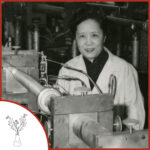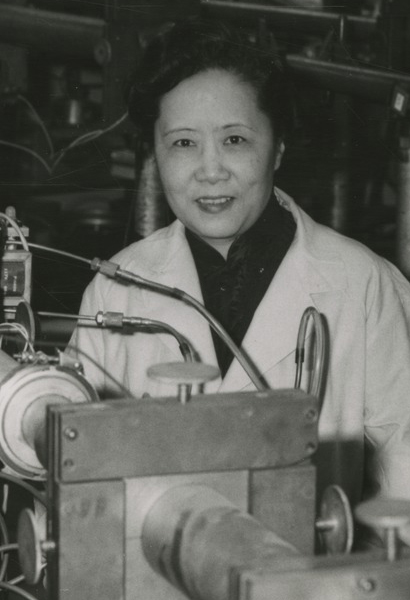

Birth: May 31, 1912
Death: February 16, 1997
Specialty: Nuclear Physics
Major Contributions:
Worked on Manhattan Project
Wu Experiment
Confirmed Conserved Vector Current Hypothesis
Thought to be the only person from China to work on the Manhattan Project, Dr. Chien-Shiung Wu has been referred to as the “Queen of Nuclear Research.”
After earning a degree in physics, she was encouraged to travel abroad to earn her doctorate. Accepted at Michigan University, she first arrived in California and visited the campus of UC-Berkeley. After hearing that at Michigan women weren’t allowed to use the front door, she requested to study at Berkeley instead and was granted admission.
At the end of her first year, she applied for scholarships but was denied due to her race. In 1940 she earned her doctorate but couldn’t get a position at the university, again because of her race, but she stayed at the school as a post-doctoral fellow. Accepting a teaching position at Smith College, she was frustrated with the lack of opportunity for research and subsequently moved to Princeton University.
As World War II was raging, she was asked to join the Manhattan Project’s Substitute Alloy Materials Laboratories where she helped develop a methodology that used gaseous diffusion for separating uranium metal into two of its isotopes. This methodology was used at Oak Ridge to create the radioactive materials for the first atomic bombs.
After the war she was hired as an associate research professor at Columbia where she designed and carried out what is now known as the Wu Experiment. Her goal was to verify the findings of other researchers looking at beta decay, but what happened was that she disproved what was known as the law of conservation of parity. While the analysis of her research earned two colleagues a Nobel Prize in Physics she was not listed on this work and therefore overlooked.
Wu designed and implemented many other studies while at Columbia and her work added greatly to the field of quantum mechanics and our understanding of the atomic world. As she grew older, she became more outspoken on political issues as well as gender inequality. She retired in 1981 and traveled the country encouraging young women to pursue STEM careers.
In 2021 the United States Postal Service announced that it would be issuing a stamp honoring Wu. According to the USPS it is rarer for a scientist to end up on a stamp than win a Nobel Prize – but the hope is that by featuring her, people will want to learn about her contributions.
Written by Angela Goad
Sources:
Postage stamp to honor female physicist who many say should have won the Nobel Prize
National Women’s History Museum: Dr. Chien-Shiung Wu
See Also:
Atomic Heritage Foundation: Chien-Shiung Wu
U.S. History.org: The Manhattan Project
